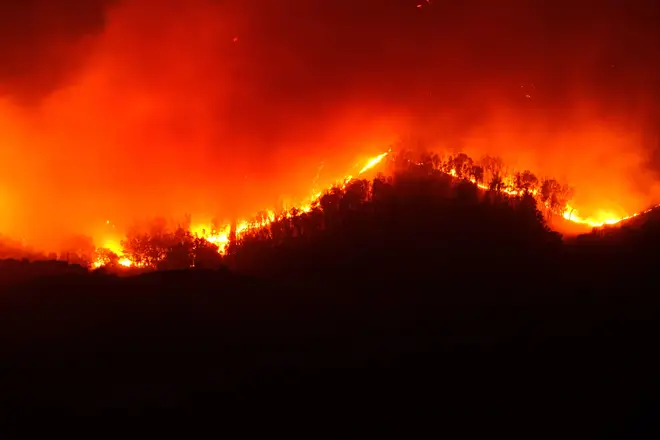
Natasha Devon 6pm - 10pm
11 August 2021, 23:17 | Updated: 12 August 2021, 08:36

A city in Sicily may have recorded Europe’s hottest-ever temperature, meteorologists have said.
Syracuse in Siciliy reached 48.8C on Wednesday, in what may be a new European temperature record, though weather experts cautioned that the measurement still must be confirmed.
The Sicily region's agriculture-meteorological information service, SIAS, reported that a temperature of 48.8C (119.84F) was reached at the island's Syracuse station.
The agency said on its Facebook page it is the highest temperature registered in the entire network since its installation in 2002.
The highest temperature ever recorded on the European continent is 48C (118.40F) in 1977 in Athens.
The Met Office said that if verified by the World Meteorological Organization, it will become a new European temperature record.

UN report sets out stark reality of climate crisis
The World Meteorological Organisation (WMO) said it would examine the reading but Randy Cerveny, the agency's rapporteur for weather records, called it "suspicious, so we're not going to make any immediate determination".
"It doesn't sound terribly plausible," he said. "But we're not going to dismiss it."
WMO spokeswoman Sylvie Castonguay said: “Extreme weather and climate events are often sensationalised and mischaracterised as ‘records’ before they have been thoroughly investigated and properly validated.”
Today has provisionally seen the highest #temperature ever recorded in #Italy 🌡️ ⚠️
— Met Office (@metoffice) August 11, 2021
SIAS have confirmed that Siracusa in #Sicily reached 48.8ºC earlier this afternoon and if verified by @WMO, it will become a new European temperature record 📈 pic.twitter.com/0L8Af2lp6r
Italy baked in sweltering temperatures that continued to drive deadly wildfires on Wednesday, with Spain and Portugal bracing for the arrival of a dangerous heatwave that has grilled south-eastern Europe and is starting to push west toward the Iberian peninsula.
A heatwave fed by hot air from North Africa has engulfed large parts of the Mediterranean region in recent days, contributing to massive wildfires and killing dozens of people in Italy, Turkey and Algeria.

Parts of southern Turkey devastated by raging wildfires
In Greece, huge wildfires have ravaged forests for a week, destroying homes and forcing evacuations.
Read more: Eight people have died in wildfires which have torn through the Turkish coast
British firefighters were deployed to Athens at the weekend, with teams sent from Merseyside, Lancashire, South Wales, London and the West Midlands fire services.
Read more: British firefighters deployed to help tackle ravaging wildfires in Greece
It comes after the death of a volunteer firefighter and the evacuation of thousands of people from an island near Athens, as well as towns north of the capital.
Earlier this week, the UN released a startling report which showed the extent of damage to the climate that has been done by humans.
Read more: Climate crisis: Human-caused damage could be irreversible for centuries - UN report
The UN warned the damage could be irreversible for decades, centuries or even millennia.
The assessment from the UN's Intergovernmental Panel on Climate Change (IPCC) paints a stark picture of the impact humans are having through activities such as burning fossil fuels - and the future the world faces if it fails to rapidly tackle the crisis.

Nick Ferrari rips apart IPCC climate change plan
The world will reach or exceed temperature rises of 1.5C - a limit countries have pledged to try to keep to in order to avoid the most dangerous consequences of warming - over the next two decades, the report says.
Temperature rises will continue until mid-century and without fast, deep reductions in greenhouse gases will, over the course of the 21st century, exceed both the 1.5C and 2C limits set by countries in the Paris climate treaty.
A summary report has been released following its approval by representatives of 195 governments, who now face pressure to take more action to cut emissions in the run-up to international Cop26 climate talks in Glasgow in November.
One of the report's lead authors, Dr Tamsin Edwards from King's College London, said: "Unless there are immediate, rapid and large-scale reductions in greenhouse gas emissions, the 1.5C target will be beyond reach."
Boris Johnson said the report "makes for sobering reading".
The Prime Minister said it was clear the next 10 years are going to be vital in protecting the Earth's future.